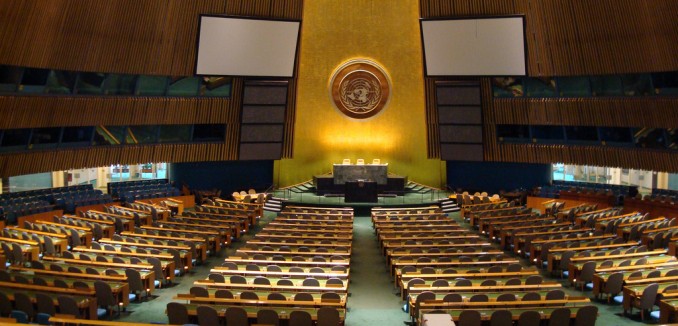The political war against the legitimacy of Israel and the Jewish state continues in many forms, including through the United Nations Committee on the Exercise of the Inalienable Rights of Palestinian People (CEIRPP). This attack was launched in the General Assembly on November 10, 1975, as part of the same package that brought us the infamous “Zionism is racism” resolution (UNGA 3379). But while the fiasco of UNGA 3379 was repealed in 1991, CEIRPP (UNGA 3376) was ignored and continues to fuel the conflict through incitement and propaganda.
If the UN and its member states want to get serious about seeking a negotiated end to this conflict, the elimination of CEIRPP would be a good place to begin.
Officially hosted by the UN, most of CEIRPP’s activities feature a network of non-governmental organizations (NGOs) that exploit human rights for political warfare and demonization. The latest CEIRPP event (April 27) focuses on “the situation of Palestinian child detainees,” featuring speakers from Addameer Prisoner Support and Human Rights Association, Defence for Children International – Palestine (DCI-PS) and Sarah Leah Whitson from Human Rights Watch (HRW).
The three organizations, accompanied by Israeli opposition NGOs such as B’Tselem and Adalah, have been running a campaign that exploits the theme of Palestinian children in order to demonize Israel. On April 11, HRW began a major media blitz around this theme, via a publication headlined “Palestine: Israeli Police Abusing Detained Children,” which alleges that “Israeli security forces are using unnecessary force in arresting and detaining children, in some cases beating them, and holding them in unsafe and abusive conditions.” In parallel, Sari Bashi, who joined HRW after years at an Israeli opposition NGO that she founded, embarked on an aggressive sales campaign among Israel-based journalists and diplomats.
The exploitation of child suffering is a particularly potent weapon in the process of political demonization, and has been used for many years to attack Israel’s legitimacy around the world. Faced with frequent images of teenagers who are portrayed as victims of Israeli “security forces,” many journalists, politicians, academics and other opinion leaders adopt this narrative without bothering to check the details or the facts.
For those who did do some due diligence, it was clear that HRW’s claims are particularly thin, reflecting the political and ideological agenda and lack of credibility long associated with this organization. The NGO’s accusations of widespread “abuse” are based on only three anecdotal cases, a statistically irrelevant sample, and the “evidence” consists of unverifiable Palestinian allegations – a core methodological defect that has characterized HRW attacks against Israel for over 15 years.
To bolster the case, HRW’s publication parrots more unverified claims from other NGOs, such as DCI-Palestine, B’Tselem, Addameer, and Military Court Watch, as well as the UN agency, OCHA-oPt (Office for the Coordination of Humanitarian Affairs — which often repeats the unverified claims of the same NGOs). All of these organizations suffer from blatant bias and severe methodological failures that put into question the credibility of their reports.
Particularly striking is the absence of context — in this case, the very high percentage of Palestinian teenagers involved in terror attacks against Israelis, including a 19-year-old suicide bomber who blew up himself and dozens of passengers in a Jerusalem bus, and whose mother told journalists that she was proud of her son’s deed. In the face of these terror attacks, Israel, like any other country in a similar situation, must protect its citizens by detaining the perpetrators and preventing them from committing further atrocities.
The inversion of the “child soldier” theme in NGO propaganda campaigns is not limited to HRW; DCI-PS has been pushing this for many years, particularly in the UN, and more recently, in the UK Parliament and among members of the U.S. Congress and State Department. In partnership with American-based pro-BDS (boycotts, divestment, sanctions) organizations, DCI-PS held a June 2015 briefing in Washington on the alleged abuse of Palestinian children in Israeli prisons. Following this propaganda event, a small group of House members sent and publicized a letter to Secretary of State John Kerry, accusing Israel of “cruel, inhuman and degrading treatment and punishment of Palestinian children.”
This theme has been picked up by the Israeli newspaper Haaretz, which is closely associated with the NGO network. An April 24 article, headlined “Sharp Rise in the Number of Palestinian Children in Prison,” could equally have been entitled “Sharp Rise in the Number of Palestinian Children in Terror Attacks.” Indeed, Haaretz at least acknowledged the centrality of teenagers in the “wave of violence that started last October,” but then repeated the standard slogans, as well as quotes from NGOs such as B’Tselem, Adalah, and Hamoked.
Given the wide range of platforms used by the NGO network to demonize Israel by exploiting the language of human rights, as well as the powerful forces involved, focusing on CEIRPP alone is not enough. Other such UN venues include the notorious Human Rights Council and OCHA-OPT. However, CEIRPP — as the UN’s Palestinian propaganda committee — causes unique damage by amplifying incitement and justifications for violence, as the campaign on “child detention” highlights. Closing down this platform would significantly reduce the level of hate and send an important positive signal to Israel and beyond.
Gerald M. Steinberg is professor of political science at Bar Ilan University and heads NGO Monitor, a Jerusalem-based research institute.
[Photo: davidpc_ / Flickr]




